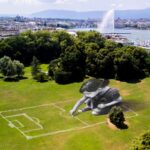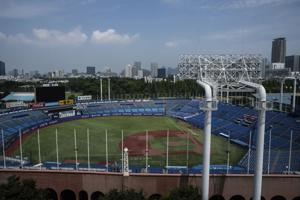TOKYO — Plans to demolish a historic baseball stadium in Tokyo, where the legendary Babe Ruth once played, have ignited a heated debate over the redevelopment of the Jingu Gaien park area. Critics argue that the project, which also involves the demolition of an adjacent rugby venue, sacrifices historical significance and green space for commercial gain. Approved by the Tokyo Metropolitan Government over two years ago, the redevelopment has already commenced, but opposition remains steadfast.
On Wednesday, a coalition of 368 experts, including urban planners, architects, and environmental scientists, alongside 1,167 other signatories, presented an open letter to Toshiko Abe, Japan’s Minister of Education, Culture, Sports, Science, and Technology. They urged a reassessment of the project, emphasizing the potential loss of public control over valuable park space and the conflict of interest involving private developers and politicians.
Historical Significance and Cultural Impact
The Jingu Gaien park area, established a century ago through public donations to honor the Meiji Emperor, holds significant cultural and historical value. The baseball stadium, where Ruth and Lou Gehrig played during a 1934 barnstorming tour, remains a cherished landmark. It also inspired Japanese novelist Haruki Murakami to pen his first novel after attending a game there in 1978.
Currently home to the Yakult Swallows baseball team, the stadium continues to host events, including concerts. However, plans for the redevelopment include constructing two 200-meter towers and a smaller tower, with the baseball stadium being relocated to the current rugby stadium’s site.
Opposition and Environmental Concerns
Opponents of the redevelopment, including Murakami, conservancy groups, and environmentalists, argue that the project threatens the area’s century-old gingko trees and green spaces. The International Council on Monuments and Sites (ICOMOS), a global conservancy body associated with UNESCO, has warned that the development could lead to the “irreversible destruction of cultural heritage.”
Critics also highlight the use of private finance schemes that grant developers access to public park spaces, drawing parallels to Hibiya Park, Tokyo’s oldest public park. The opposition faces formidable adversaries, including real-estate giant Mitsui Fudosan, the Shinto religious body, and Tokyo Governor Yuriko Koike.
“The problem is that many Japanese citizens are not so much interested in democratically regulating their own city and are used to demolishing buildings,” wrote Kohei Saito, a Japanese political economist at Tokyo University. “Companies with political power try to maximize their short-term profits without consideration of Tokyo’s attractiveness (history, culture), inhabitants’ well-being, and future generations.”
Zoning Changes and Political Implications
The controversy is further complicated by zoning changes made around 2013, when Tokyo secured the bid for the 2020 Olympics. These changes, which permitted the construction of the neighboring National Stadium, also applied to the Jingu Gaien park area. The open letter from opponents criticizes the rezoning process as lacking transparency and democratic procedure, labeling it an “illegal abuse of the governor’s discretion in urban planning decisions.”
The Jingu district was considered “common property” until after World War II when it was sold to Shinto with the understanding it would remain a public space. The national government’s involvement stems from the rugby venue, owned by the Japan Sport Council, which represents about 30% of the Jingu Gaien area.
Future Prospects and Historical Comparisons
As Japan approaches a national election later this month, opponents hope the political climate might favor their cause, particularly with Prime Minister Shigeru Ishiba leading a minority government. Notably, former Prime Minister Yoshiro Mori, who has ties to the rugby venue, could influence the outcome due to his past roles in sports administration.
Proponents of preserving the stadium point to international examples like Fenway Park in Boston and Wrigley Field in Chicago, which have been successfully refurbished despite their age. Meanwhile, Meiji Kinenkan, a historic reception hall in Jingu Gaien dating back to 1881, remains in use without calls for demolition, further questioning the necessity of the redevelopment.
The proposed new rugby stadium, an indoor venue with artificial turf, has also drawn criticism from players who prefer natural grass surfaces. As the debate continues, the future of this historic site hangs in the balance, with implications for Tokyo’s cultural heritage and urban landscape.
About The Author
 Women’s Euro 2025 Kicks Off in Switzerland: A New Era for Women’s Football
Women’s Euro 2025 Kicks Off in Switzerland: A New Era for Women’s Football Wimbledon 2025 Day 3: Alcaraz, Sinner, and Keys Aim to Avoid Upsets
Wimbledon 2025 Day 3: Alcaraz, Sinner, and Keys Aim to Avoid Upsets Vote Now: Patriot Ledger’s High School Baseball Player of the Year
Vote Now: Patriot Ledger’s High School Baseball Player of the Year Luka Garza Joins Boston Celtics: What He Brings to the Team
Luka Garza Joins Boston Celtics: What He Brings to the Team Sunderland Secures Habib Diarra in Ambitious Five-Year Deal
Sunderland Secures Habib Diarra in Ambitious Five-Year Deal